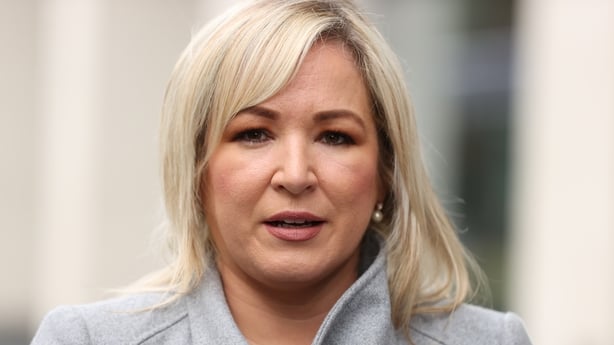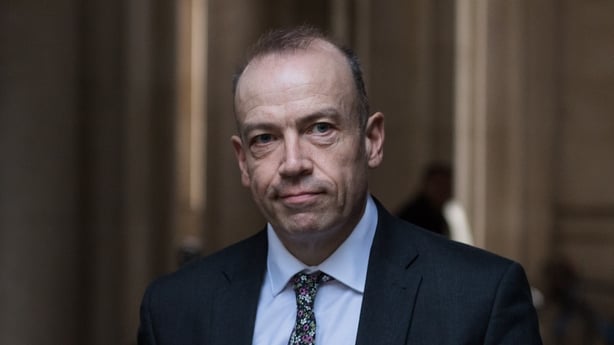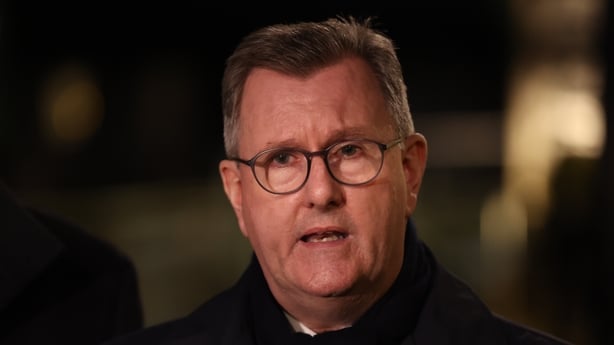The political landscape of Northern Ireland experienced truly seismic and historic change, yet nothing changed.
It was a year of firsts.
The Stormont Assembly election in May was a watershed moment with Sinn Féin emerging as the largest party for the first time and a nationalist/republican being entitled to hold the position of First Minister for the first time.
The latest Census also revealed that, again for the first time, there are now more Catholics living in Northern Ireland than Protestants, something its founders would have thought impossible as it was designed to have a permanent inbuilt Protestant and unionist majority.
But it was also a year of Groundhog Days as one Alliance Party member put it with Stormont once again in limbo and a state of crisis.

Almost eight months after emerging as the First Minister designate Sinn Féin's leader in Northern Ireland Michelle O’Neill has still not spent a single minute in the post as the DUP is boycotting power sharing.
The party insists it will not go back into the Stormont Executive until its concerns over the Northern Ireland Protocol are addressed to its satisfaction.
Some of its critics, including Sinn Féin, say the real reason is simply that it wants to be number one rather than two, that many within DUP ranks cannot countenance playing second fiddle to a republican head of government.
It was also a year of threes and shorts.
There were three British prime ministers as the Conservative Party devoured itself in frenzied in-fighting that saw the once seemingly invincible Boris Johnson replaced by Liz Truss, who became the shortest serving PM in UK history when she resigned after just 45 days and was replaced by Rishi Sunak.
There were also three Northern Secretaries during the past year with Brandon Lewis eventually declaring a loss of faith and support in Boris Johnson and stepping down as the curtain was coming down firmly on his boss’s time in office.
His replacement Shailesh Vara lasted just 62 days before being sacked, becoming the shortest serving Northern Ireland Secretary of State.

The new and current post holder Chris Heaton-Harris was appointed on 6 September so has already avoided the possible ignominy of replacing Mr Vara in the record books.
NI Protocol
Throughout all of this turmoil there was one constant: the dispute over the Northern Ireland Protocol.
The DUP and its supporters, and the loyalist paramilitary organisations in Northern Ireland, insists that the post Brexit arrangement between the British Government and the EU weakens and threatens Northern Ireland’s constitutional position within the UK.
Mr Donaldson’s position on the issue has hardened.
"Many within the DUP will have had a nervous festive season amid growing concerns that Mr Sunak is preparing to strike a deal with the EU"
Initially most of the talk was about the need to end checks on goods arriving in Northern Ireland from Britain, but the MP used his speech at his party’s annual conference in Belfast in October to make it clear that that would not be enough.
He said the checks, the so called Irish Sea Border, were but a symptom of the problem which is that Northern Ireland "is subject to a different set of laws imposed upon us by a foreign entity without any say or vote by any elected representative of the people of Northern Ireland."
Many within the DUP will have had a nervous festive season amid growing concerns that Mr Sunak, eager to boost the British economy, is preparing to strike a deal with the EU that will fall short of its demands and far short of those of extreme loyalist elements.
Anniversary of Good Friday Agreement
Pressure is mounting on the British prime minister to resolve the dispute before the 25th anniversary of the Good Friday Agreement in April.
It is known that the Irish Government wants US President Joe Biden to be part of events to celebrate an agreement cited around the world as an example of best practice in difficult political negotiations.
No deal with the EU on the Protocol will mean no DUP in Stormont and no functioning power-sharing administration.
That would almost certainly mean no lap of honour for President Biden, Taoiseach Leo Varadkar and Mr Sunak.
Even if there is a deal between the UK and the EU on the Protocol, the DUP will have to decide on whether it will give the stamp of approval.
If it does not, the party could turn any future Assembly election into a de facto referendum on the Good Friday Agreement and power sharing itself.
Again, not the kind of political environment that would lend itself to a celebratory mood.

At some point in the not too distant future Mr Donaldson and his senior advisors may be asked to make a choice: back a British government deal with Europe on the Protocol or oppose it.
If it decides that any future deal is as good as its likely to get and gives its approval the party is likely to face huge criticism and opposition from people like Jim Allister, leader of the hardline Traditional Unionist Voice and its supporters, as well as loyalist paramilitaries.
If it refuses to endorse any future deal, Stormont will be mothballed and power-sharing suspended for the foreseeable future.
That brings huge risks for the DUP as the Irish Government has made clear that there will be no return to "direct rule of the past" as the Good Friday Agreement gives it a consultative role along with the British Government.
Not joint authority, but a seat at the table and a right to be heard.
An end of power sharing and return to direct rule would also almost certainly accelerate the debate about the need for a Border Poll and the merits of a United Ireland as an alternative.
This New Year will begin as many have in the past, with many hoping that the latest political crisis can be resolved.
But there will also be a sense of realism borne from painful experience.
It may be an idea to prepare for 2 February, officially Groundhog Day in the United States and Canada; it could be marked on a monthly basis in Northern Ireland.







